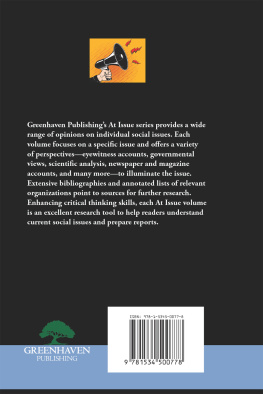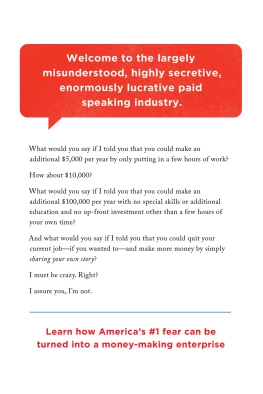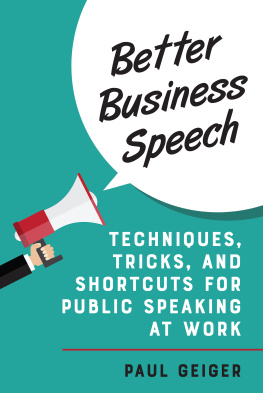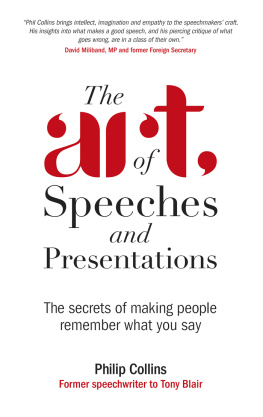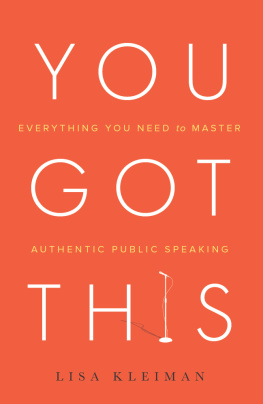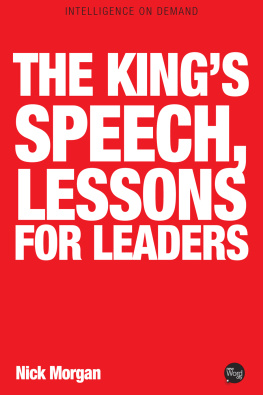O N
S PEAKING
W ELL
H OW T O G IVE A S PEECH
WITH S TYLE , S UBSTANCE, AND C LARITY
P EGGY N OONAN

Contents
For Joan and Pete
The mind is a wonderful thing. It starts working the
minute youre born and never stops until you get
up to speak in public.
R OSCOE D RUMMOND
T his is a book of advice and anecdotes about the writing and giving of speeches. It is about what works and what doesnt when youre communicating using only words in the air.
It is not solely about political speeches, for they are only one stream off the great river of rhetoric. Instead it is for people in any area of life who find themselves asked to speak in public and are not entirely comfortable with the prospect.
Which would be a lot of us. We are all asked sooner or later to say a few words at the annual meeting, the parent-teacher gathering, the awards dinner, the memorial service, the wedding. But I think these days Americans are speaking in public more than ever. For years social observers have worried that TV, videos and home entertainment centers were detaching us from each other, fracturing our sense of community, keeping us home on the couch watching instead of outside with others doing. But I am increasingly struck by the sheer number of meetings and gatherings that take place every night in Americas cities and townslectures, visiting authors, visiting celebrities, An Evening with , cultural gatherings, political meetings. People seem to be speechifying more than ever.
The changes that have swept modern business have contributed to the talking boom. As more and more businesses become involved in the new media technologies, as we become a nation of fewer widgets and more Web sites, a new premium has been put on the oldest form of communication: the ability to stand and say what you think in front of others. At the business conference, in the teleconference and the seminar, businessmen and -women are increasingly called on to speak about their industry, their plans, the realities within which they operate, what government is doing or not doing to make things better or worse. And theyre not alone: Teachers and professors and reporters and doctors are out there too. Sooner or later were all on C-Span. Postmodern America is becoming what it was a hundred years ago: a big Chautauqua Circuit where everyone goes to listen or talk.
In one way this is nothing new. The first word of the first caveman may have been hello, but it was probably followed by stand-up: So Im sitting by the fire and this antelope comes over the hill (I suspect the first punctuation was not the period but the colon.) But now the audience is bigger, the event is being broadcast, and a certain ease is expected.
The astonishing thing is that people have grown so good at it, so capable of meeting the demands of their public moment. It seems that all of us, from the slowest teenager in the poorest tenement, know how to appear on televisionhow to act and move our hands and voices on talk shows, on Sally Jessy and Montel. We know how to speak to the local camera crew at the scene of the story. No one is shy anymore. We are like a nation of little anchormen and -women, giving the reporter the sentence she needs, shaking our heads in the right way. We are media savvy. But we still, being human, have trouble saying things that are true and interesting. Instead we tend to say what we know is expected.
The exception to all this surprising and arguably depressing media expertisetechnology, after all, was supposed to help us make communication simpler and clearer, not just more prevalentis the speech. A speech is more formal, more focusedthe audience is not distracted by the story unfolding around you; there is no host to ask, And how did you feel at that moment? Because everyone knows you had time to prepare, and have presumably done your best, that is what people expect: your best. You stand at the podium alone, clear your throat, look out at the eager faces looking at you
There was a poll a few years ago that said that of all the things to be feared in lifedeath, disease, drowningAmericans picked as their number-one fear public speaking. I was not surprised. I had been a public-speaking-phobe for forty years when I made my first speech.
But stage fright is only half the challenge for most people. The other half is the Now I Have to Write It problem. Which means: You have to figure out what youre going to say, and then you have to figure out how youre going to say it. Here your mind freezes, held back by a number of things, including the idea many people have, the idea theyve received, that speeches are magic, that they are some combination of sorcery and show business that cannot, by a normal human, be achieved.
But speeches are not magic. Reduced to its essentials, a speech is a combination of information and opinion written on paper and spoken with the mouth. If you can have a thoughtful conversation you can probably write and give a thoughtful speech.
This book is intended to offer information and observations that will help.

When I told a friend that I was writing this book, she said, How can you teach someone to write a speech when its such an intuitive sort of thing? It is. But my thinking is, there are things in every art or craft that can be pointed out and emphasized, pitfalls that can be highlighted and avoided. If I were a piano teacher I would tell my pupil, I cant make you Toscanini, only you and God can make you Toscanini. But I can tell you things Ive learned, and you may benefit from my experience.
These are things Ive learned.
I m tempted to begin this the way Readers Digest used to: So you want to give a speech
There you are in the den, the kitchen or the dining room, and youre thinking, How do I get out of it?
The original invitation probably left you almost limp with self-love. They like me, they really like me. But now it is three weeks later and the speech is Tuesday and your mouth is dry as cotton, your heart dysrhhythmic, and in its wild thumping you are hearing the words: I gotta GIVE it, I GOT to stand there and theyll ALL be LOOKing at me
Your first thoughts are constructive alternatives: If I get in a car accident I wont have to speak. But its hard to calibrate the exact extent of injury when you swerve across the fast lane into a divider, so you reconsider.
And sit. And shift in your chair. And begin, in a desultory manner, to type:
Thank you, ladies and gentlemen. It is nice to be here.
Try a joke.
Thank you, ladies and gentlemen. Before I get to the heart of my remarks, I just thought Id tell youTheres three guys in a boat, a black guy, an Irishman and a Jew
No.
A man walks into a bar with a duck on his head
No.
So Bill Clintons jogging down the street and he sees a cat in heat and he says
No.
Thank you for being here. I mean of course you had to be here, but thank you for inviting me even though I of course had to be here too, but I didnt think Id ever have to speak
No.
You try to summon from within what frightens you most. It is dishearteningly easy. You will be so nervous you will not be able to stop shaking and they will see your arms vibrateyou will look like a three-year-old saying, See, Daddy, I can fly. You will vibrate so hard youll knock the pages off the podium, youll bend to pick them up, lose your place, look out at the audience and your first words will be In conclusion
Next page


